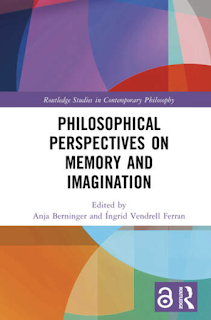This post is by Anja Berninger (University of Göttingen) and Íngrid Vendrell Ferran (University of Marburg). Today their post is on the edited volume Philosophical Perspectives on Memory and Imagination (Routledge 2022).
 |
| Íngrid Vendrell Ferran |
- What are the central structural features of memory and imagination?
- Are memory and imagination two clearly distinct kinds of mental states?
- What are the norms that govern imagination and memory?
- How do memory and imagination interact with each other and with other mental states (such as emotions)?
- What roles do memory and imagination play in our lives?
The contributors to this volume have chosen a wide array of different approaches and methods to discuss the topic. Some authors draw heavily on empirical research, while others take inspiration from phenomenology or conceptual analysis. Quite a few of the papers take novel perspectives on the issues by looking at memory and imagination through the lens of other central concepts such as skills, abilities or directions of fit or by putting both in relation to other concepts such as the notion of forgetting.
 |
| Anja Berninger |
The volume is structured into four main parts. The first consists of novel contributions to ontological issues regarding the nature of memory and imagination and their respective structural features. These topics are explored in chapters by Langland-Hassan, McCarroll, Barner, Michaelian and Noordhof. The second part focuses on questions of justification and perspective regarding both states.
These issues are explored in chapters by Miyazono and Tooming, Arcangeli, and Peeters, Cosentino, and Werning. The papers in the third part discuss issues regarding memory and imagination as skills or powers. These issues are explored by Kind, Hopkins and Robins. The last part explored by Vendrell Ferran, Berninger and Teroni focuses on the relation between memory, imagination, and emotion.
Each contribution to this volume contains pioneering work in examining the interrelation between memory and imagination. We hope that this volume will be of value and interest to researchers working in fields relevant to both mental states, and that this collection will serve to advance the recently inaugurated debate on memory and imagination.
